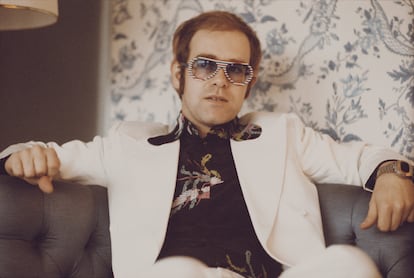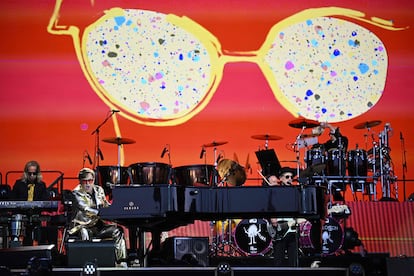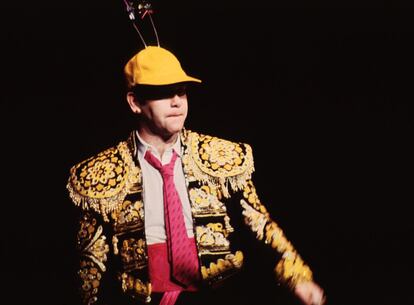Elton John’s retirement: the pianist who tattooed melodies on our heads
The British musician leaves the stage after recording more than 40 albums and earning the admiration of dozens of musicians who have shaken off the prejudices surrounding his quirky personality

Back in the spring of 1980, Elton John (Pinner, UK, 76 years old) released an album that almost nobody mentions in the immensity of his discography, because it did not include any of his unquestionable hits or arguments that would provide significant glimpses of excellence. It was titled 21 At 33 and the fact that many were unable to decipher the strange numerical hieroglyphic of its baptism contributed to its lack of recognition. It wasn’t that difficult either: its author had just turned 33, the age of Christ, and those nine songs represented the twenty-first album of his career. It was, in the end, a way of showing off.
That LP will never go down in history, but Elton John will. And with full honors. Mainly, for the extraordinarily prolific and inspired nature of his work during the seventies, and for the overwhelming concentration of great albums, more than one per year, that preceded that irrelevant 21 At 33. Because the man who said goodbye this Saturday in Stockholm to almost six decades of live music bequeaths a much more transcendental work than those detractors for whom he has only been a quirky pianist, a composer akin to molasses or the tearful friend of Princess Lady Di will ever acknowledge.
Last night, at the Tele2 Arena stadium in the Swedish capital, Elton John appeared in one of his usual colorful jackets at the beginning of what he announced would be his last concert and which closes the Farewell Yellow Brick Road tour. Thousands of fans of the author of hymns such as “Candle in the Wind” lined up under a scorching sun before attending the farewell to the stage of their idol, reported Agence France Presse.

Reginald Kenneth Dwight has never been an artist that arouses great unanimity, among other things because in a service sheet with more than 40 studio works there is also room for some stumbles, stumbles, mediocrities and just routine deliveries. But not infrequently he has been subjected to a process of caricaturization reminiscent of that suffered by a generation mate who also shared memorable hits and indecent scorns in the history of British pop: Phil Collins. As in the case of the Genesis singer and drummer, Elton John tended to be portrayed as a sweetened and cloying balladeer, a stigma that was not helped by the fact that both ended up delivering sappy melodies to the Disney factory. But, beyond punctual sins, the musical legacy of the author of “Rocket Man” is so overwhelming -at least in the nine albums from Elton John (1970) to Rock of the Westies (1975), and we are being stingy in the calculation- as to place him to the very right of the greatest pop prodigy of all times: the Lennon/McCartney duo.

It is no coincidence that Lennon, soon to be unstuck in his solo career, turned to Elton John as a revivalist for “Whatever Gets You Through The Night” (1974), which would become his first solo number one. Lennon thanked him for that push by bursting in as a guest star at Elton’s celebrated Madison Square Garden concert in November 1974, one of the undisputed milestones of the man who, barring an unlikely change of heart, has just said goodbye to the stage forever.
Elton John has not been a creator of easy beginnings or instant success. What’s more, his official debut, Empty Sky (1969), was faint and flimsy, and usually occupies a prominent place in the rankings of famous artists with debuts very close to fiasco. The curious thing is that it was not even, strictly speaking, his first album: in 1968 he had already delivered a 12-song LP, Regimental Sgt. Zippo, but the conceptual similarities with The Beatles’ Sgt. Pepper’s were so blatant that his record company opted to put it in the drawer. John did not dare to let it see the light of day until June 2021, 53 years later, when he already feels in a position to claim his vast songbook as a coherent whole, beyond its ups and downs.

After the stumble of Empty Sky, Elton and his then lyricist, Bernie Taupin, got it right with the beautiful “Your Song” for the second LP, the eponymous Elton John (1970), and from then on the take-off was as brilliant as that of the Rocket Man rocket. The best music of that decade would be amputated without titles like “Daniel, Tiny Dancer, Bennie & The Jets”, “Goodbye Yellow Brick Road” or, somewhat later, “Don’t Go Breaking My Heart” or “Someone Saved My Life Tonight.” The partnership with Taupin has remained intact for more than half a century, barring a brief divorce in the late seventies, and continued to yield great songs until a couple of less iconic albums, Too Low For Zero (1983) and Breaking Hearts (1984). From then on, we can’t compute any irrefutable LP, but Sir Elton knew how to straighten out with the new century a course that, between fatigue and his drug problems, had become erratic.
Dwight hit rock bottom with the very poor Leather Jackets (1986), conceived amidst reckless amounts of alcohol and cocaine, and of which its author himself has acknowledged “hardly remembering anything” of the recording process. But only three years later would come the commercial resurrection of the single “Sacrifice”, paradigm of that syrupy Elton that aroused as many adhesions as outbursts. It is a duality that the Barcelona singer-songwriter Litus (Terrassa, 43 years old), today a great admirer of the Briton and at the time much more reluctant to admit his merit, experienced in his own flesh.

Another illustrious and unconditional follower is the pianist Luis Prado (Alicante, 51 years old), former leader of Señor Mostaza and today a soloist and member of Miguel Ríos’ band. “Elton John’s secret is very simple,” he emphasizes: “He plays and sings incredibly well and makes very good songs. He is also in love, “obviously”, with the albums of the seventies, “in which he sounds almost like a gospel singer, as if he wrote thinking that his scores would end up being interpreted from Aretha Franklin to his great idol Leon Russell”. Prado is amazed by both “the memorable refrains, from ‘Tiny Dancer’ to ‘Rocket Man”, and “the heavenly chord changes”, quintessential in the case of Goodbye Yellow Brick Road (1973). And it extends Elton’s state of grace into 1983, with I’m Still Standing. “It’s the first song I ever heard him do, so it has added sentimental value, but it’s still great.”
Another devoted pianist? Let’s ask 51-year-old Alejandro Pelayo from Santander, composer of instrumental music and Leonor Watling’s tandem in Marlango. “The key lies in unforgettable melodies, so closely linked to the lyrics that I always thought it was a miracle that composer and lyricist were two different people,” he reflects. “The melodies are tattooed in our heads because they are linked to the words in a magical and definitive way. And, besides, Taupin is in no hurry to tell the story, he takes his time. It happens in ‘Tiny Dancer’, ‘Your Song’ or ‘I’m Still Standing’, and it’s fabulous.”
Elton John was, right from his first steps, biopic fodder: the not very self-complacent Rocketman (Dexter Fletcher, 2019) was only a matter of time. He has known all the excesses and embodied the greatest extravagances, emerged as a global LGTBI icon after long years in the closet and has made enough artistic mistakes not to mythologize him. But the musical legacy, seen in its globality, places him among the 10 greatest living pop composers. “And also his human dimension,” adds Litus. “I think it’s precious that he helped people like Robbie Williams to get out of addictions, and that he tried until the last moment with George Michael. He has been a good friend, and I think that’s very nice”.
Sign up for our weekly newsletter to get more English-language news coverage from EL PAÍS USA Edition
Tu suscripción se está usando en otro dispositivo
¿Quieres añadir otro usuario a tu suscripción?
Si continúas leyendo en este dispositivo, no se podrá leer en el otro.
FlechaTu suscripción se está usando en otro dispositivo y solo puedes acceder a EL PAÍS desde un dispositivo a la vez.
Si quieres compartir tu cuenta, cambia tu suscripción a la modalidad Premium, así podrás añadir otro usuario. Cada uno accederá con su propia cuenta de email, lo que os permitirá personalizar vuestra experiencia en EL PAÍS.
¿Tienes una suscripción de empresa? Accede aquí para contratar más cuentas.
En el caso de no saber quién está usando tu cuenta, te recomendamos cambiar tu contraseña aquí.
Si decides continuar compartiendo tu cuenta, este mensaje se mostrará en tu dispositivo y en el de la otra persona que está usando tu cuenta de forma indefinida, afectando a tu experiencia de lectura. Puedes consultar aquí los términos y condiciones de la suscripción digital.









































